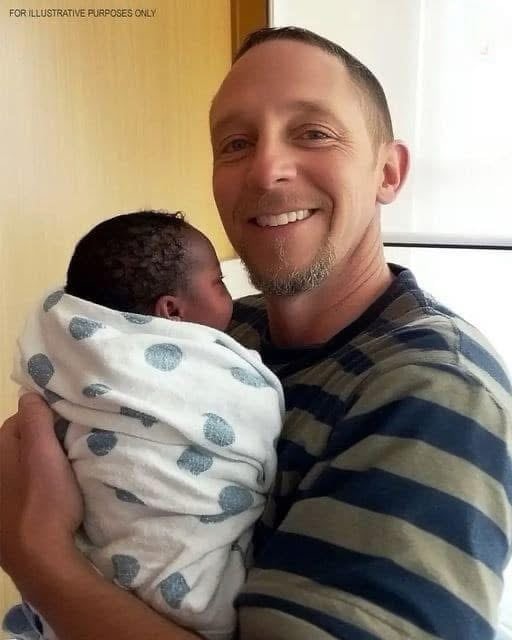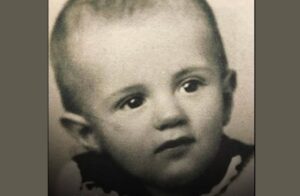Accusations, one right after another, erupted from the family members gathered outside the delivery room when our baby arrived—dark-skinned, with curly black hair.
My wife Stephanie and I are both white, so the immediate reaction was suspicion.
Whispers of betrayal, of secrets kept, filled the air. What should have been the happiest day of our lives, after years of struggling to become parents, turned into a storm of doubt and fear.
I was inside the delivery room, exhausted, anxious, and trembling, waiting to finally hold my baby girl. Outside, family members whispered and speculated, bracing themselves to rush in at the first cry. Every passing second stretched unbearably.
I squeezed Stephanie’s hand over and over, whispering, “It’s okay, everything is going to be fine. You did amazing.” Her face was pale, drenched in sweat, but her eyes still held that spark I had fallen in love with.
And then, finally, she screamed—the baby had arrived. The nurse carefully tried to place the tiny bundle into Stephanie’s arms. But instead of joy, a piercing scream filled the room.
“No! That’s not my baby!” Stephanie yelled, recoiling as if the infant were a stranger.
I froze. My mind struggled to process the image before me—a small baby with dark skin, round cheeks, and tight black curls. Unable to control my shock, I muttered, “What the hell, Stephanie?”
“It’s not mine! It’s not mine!” she repeated, panic flashing in her eyes. But it had to be hers. The umbilical cord still connected them, proof that she had given birth. Yet, the color of her skin and hair made it seem impossible.
“Please, Brent, you have to trust me. I’ve never been with anyone else. Not ever,” Stephanie pleaded, tears streaming down her face. Her voice trembled, but her eyes were desperate, searching mine for a sign of belief.
Outside, some family members weren’t patient enough to wait. Whispers became muttered judgments, and judgment became cruel statements. “How could she do this to you?” one aunt said. “It’s obvious!” my uncle whispered, eyes narrowing. The tension pressed down on me like a heavy weight.
My mind raced. “Was she having an affair?” I asked myself repeatedly. “If not, how could this baby have dark skin and curly black hair?”
I took a careful, long look at my daughter. And then I noticed it—my eyes, my smile, the same dimples in her cheeks. My heart skipped a beat. Could this tiny, perfect human being really be mine?
I needed space to think. I told Stephanie I would step out for a moment, promising I wouldn’t abandon her until I understood the truth.
At the end of the hall, my mother waited, her expression sharp and familiar—the same look she gave me as a child when I’d been caught in trouble. “Brent, you can’t stay with her,” she said harshly. “Don’t be naive. Your wife has betrayed you. Accept it. No matter how much you love her, don’t ignore the truth.”
Her words stabbed at me. I looked at my daughter again. The eyes, the dimples—they screamed mine. But doubt, fueled by my mother’s warning, crept in like poison.
Hours later, I returned to Stephanie’s room. She sat there, exhausted, with the tiny dark-skinned baby asleep in her arms. Her face was pale, her eyes tired but still filled with hope. “Brent… please… trust me,” she whispered. My heart ached. I wanted to believe her, but I had questions that needed answers.
We ended up at the hospital’s genetics department. Blood samples were drawn, cheek swabs taken. They said it was a routine check, but it felt like the heaviest moment of my life. The world seemed to shrink to the size of that tiny room, the sterile smell of antiseptic pressing against my chest.
When the results came, relief and shame collided inside me. The baby—my baby—was biologically mine. Stephanie had told the truth. The doctor explained about recessive genes, about how traits from generations past could appear suddenly, explaining the dark skin and curly hair. My mind struggled to grasp the science, but my heart understood what it had already felt.
Ashamed for doubting her, I clutched the results like a lifeline and returned to Stephanie. She looked at me, exhausted and anxious. When I handed her the paper, her face softened, tears spilling down her cheeks.
“I’m sorry I doubted you,” I whispered, voice breaking.
She took my hand and squeezed it gently. “It’s okay. We’ll be okay now,” she said. And then, as if all the tension and fear had melted away, she fell asleep, finally able to rest.
I held my daughter in my arms. Tiny, perfect, fragile… and entirely ours. She was mine. And at that moment, the chaos outside the room—the accusations, the whispers, the doubts—faded completely. Only the warmth of my family, whole at last, remained.













+ Немає коментарів
Додайте свій